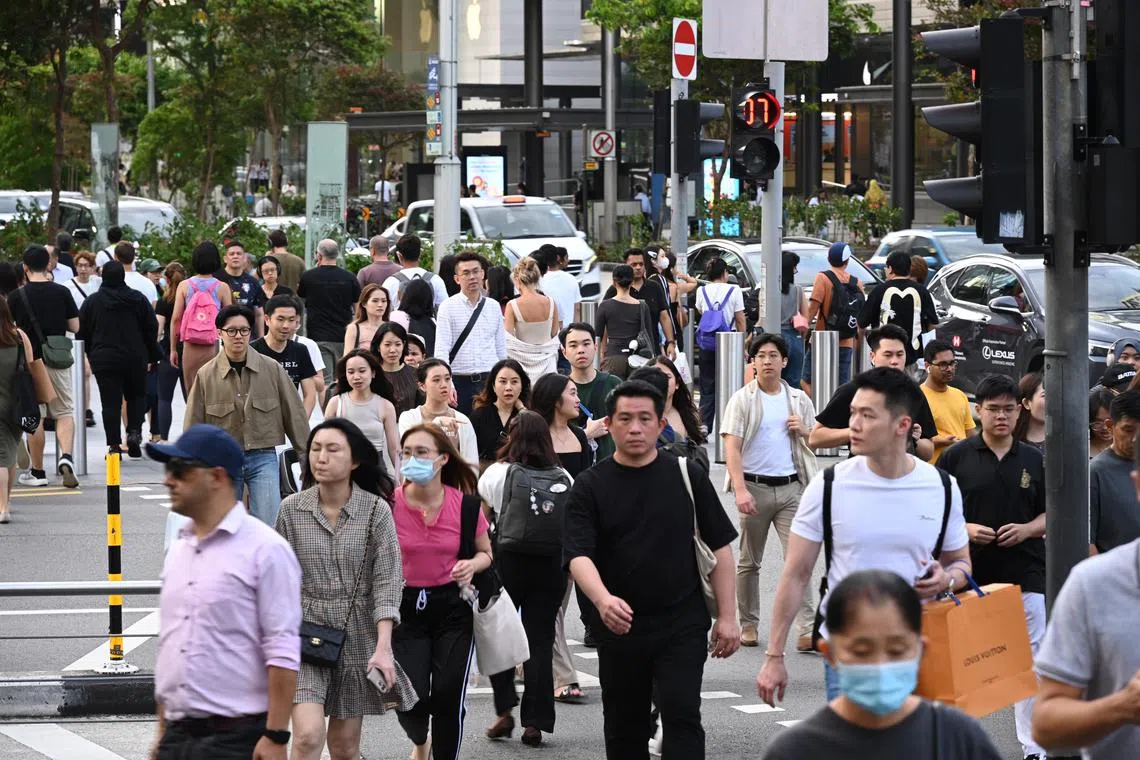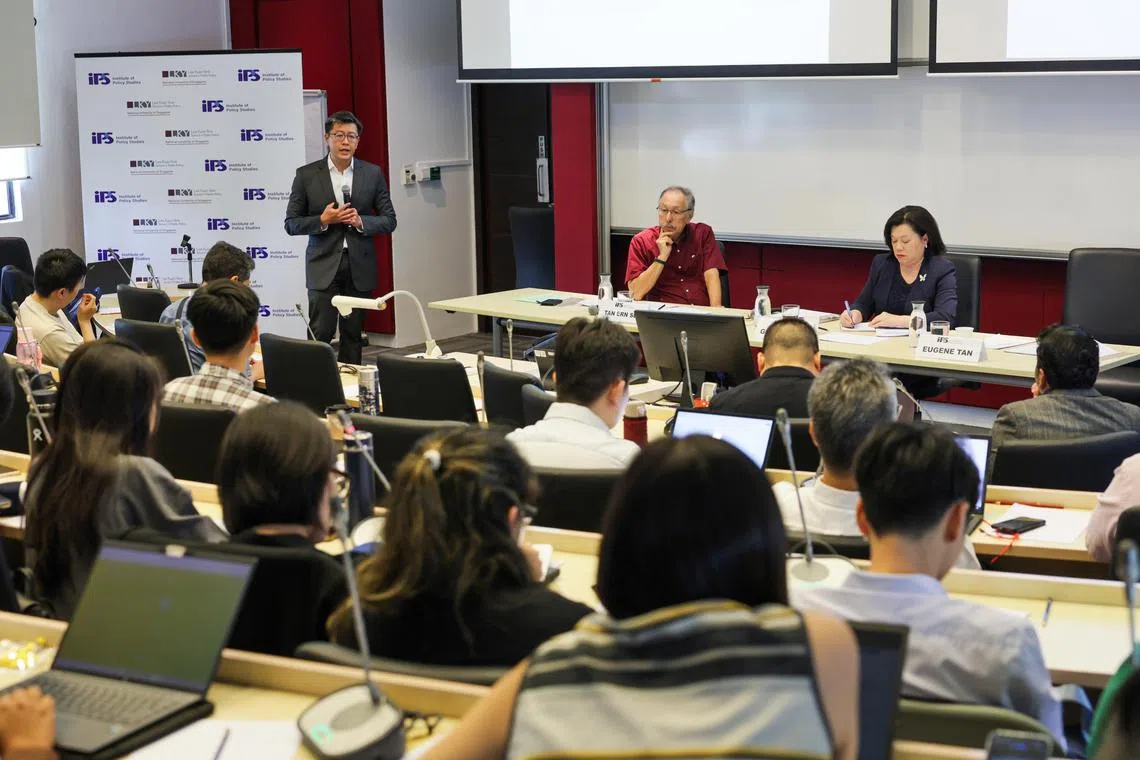Singaporeans feel country more democratic now than a decade ago, show support for system: Poll
Sign up now: Get ST's newsletters delivered to your inbox

The previous three editions of the survey also consistently found that Singaporeans felt the country had become more democratic than a decade before.
ST PHOTO: DESMOND WEE
SINGAPORE – Singaporeans largely feel the country is more democratic now than it was a decade ago, according to findings from an Institute of Policy Studies (IPS) survey released on Sept 27.
But their understanding of the concept is nuanced, with a stronger emphasis on substantive aspects, such as having necessities like food, clothes and shelter for all.
They also deem it important to democracy that people choose government leaders in free and fair elections, that the government ensures law and order, and that politics is clean and free of corruption.
The survey, conducted in late 2023, showed that Singaporeans conversely placed less emphasis on political-civic rights, such as the freedom to protest or express political views openly.
IPS researchers had given about 1,000 participants four questions with four statements to choose from. These reflected the substantive, procedural, good governance and political-civic rights aspects of democracy.
While there is robust support for democracy in Singapore, citizens have a relatively nuanced understanding of it, said Singapore Management University law don Eugene Tan on the findings. He added: “We certainly don’t ape Western interpretations of democracy.”
He also noted that the one-party dominant system has allowed the ruling People’s Action Party (PAP) government to socialise Singaporeans to its conception of what democracy is or ought to be, as well as the desired outcomes and how politics ought to be practised.
Associate Professor Tan, who was speaking on an IPS panel on the survey results, added that the findings also reflect that Singaporeans would prefer an incremental pace of change in democratic practices, politics or governance.
He was referring to the Singapore edition of the Asian Barometer Survey on Democracy, Governance and Development, conducted by IPS senior research fellow Gillian Koh and research assistant Cheow Jin Jie, as well as IPS Social Lab adjunct principal research fellow Tan Ern Ser and research fellow Teo Kay Key.
This is the sixth wave of the survey on political attitudes in the Asia-Pacific region. It is administered in 15 societies and countries, including Japan, South Korea, Malaysia, Thailand and Vietnam.
IPS has conducted and funded every wave in Singapore since the third one in 2010. The survey involved Singaporeans aged 21 or older, with findings weighted when needed to improve the sample’s representativeness and allow findings to be generalised.
The results were released on Sept 27 at the IPS Forum on Singaporeans’ Political Attitudes, held at the Lee Kuan Yew School of Public Policy. The event included a panel on the survey’s trends moderated by Dr Tan, with Dr Koh and Prof Tan as speakers.
The findings also showed that participants aged 35 or older were more likely to think there has been no change in democracy today when compared with 10 years before.
Those with technical or secondary education were more likely to think Singapore is less democratic now.
But researchers pointed out that across the different waves of the survey, Singaporeans have shown strong support for the statement, “Democracy may have its problems, but it is still the best form of government.”
In the 2023 edition, 72.2 per cent of respondents strongly agreed or agreed with this statement.

(From left) SMU law don Eugene Tan, IPS Social Lab adjunct principal research fellow Tan Ern Ser and IPS senior research fellow Gillian Koh at an IPS panel on the survey results on Sept 27.
ST PHOTO: GIN TAY
The previous three editions of the survey also consistently found that Singaporeans felt that the country had become more democratic than a decade before.
There is also a strong belief that democracy is suitable for Singapore and a strong expectation that the country will continue to be democratic in 10 years’ time. Both questions saw a mean score of around 7.5 out of 10, with the maximum being completely suitable or completely democratic.
At the event, NUS’ East Asian Institute principal research fellow Lam Peng Er also compared local findings against those from South Korea, Taiwan and Japan due to their similarities as relatively affluent societies and how that underpins political stability.
He said the latest findings from the Asian Barometer Survey showed that all four societies rate their political systems quite positively as democratic, with Singaporeans being the most positive.
While all four value their systems of government quite favourably, Singaporeans have the most favourable outlook, with 79.1 per cent thinking that the system works fine, or needs only minor change.
This is in comparison with 63.6 per cent in Taiwan, 59.5 per cent in Japan, and 58.1 per cent in South Korea.
Unlike before, the 2023 report saw researchers classify Singaporean respondents according to three archetypes based on their contentment with democracy and the current system of government.
About 22.1 per cent fell into the group that were the most content, followed by 53.9 per cent in the middle group, and 24.1 per cent on the other side of the spectrum – that the researchers classified as “ambivalent”.
Income and gender were two key factors affecting how contented respondents indicated they felt.
The most content were more likely to be male and belong to an ethnic minority group, while the middle group was more likely to be female and in the higher income brackets – the top 40 per cent.
Those in the last group were more likely to be male and in the bottom 60 per cent in terms of income. They would also be more likely to view the distribution of power and resources negatively as compared with the other two archetypes.
They also asked respondents about their sense of closeness to political parties in Singapore.
Among the most content, 63.9 per cent felt closest to the PAP compared with 63.7 per cent of the middle group and 42 per cent of the ambivalent group.
A total of 10.8 per cent of the most content felt closest to the Workers’ Party, while 5.9 per cent of the middle and 15.5 per cent of the ambivalent group chose this option.
And 21.1 per cent of the most contented respondents did not feel close to any party, while 27.4 per cent of the middle group and 34.8 per cent of the ambivalent group felt similarly.
The rest either felt closest to other opposition parties, or chose the not applicable option.
Dr Koh suggested that these archetypes could be used to inform political parties in their campaigning and policy suggestions.



